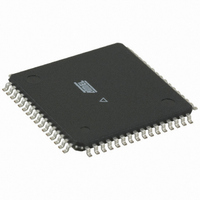ATMEGA169P-16AU Atmel, ATMEGA169P-16AU Datasheet - Page 237

ATMEGA169P-16AU
Manufacturer Part Number
ATMEGA169P-16AU
Description
IC AVR MCU 16K 16MHZ IND 64-TQFP
Manufacturer
Atmel
Series
AVR® ATmegar
Specifications of ATMEGA169P-16AU
Core Processor
AVR
Core Size
8-Bit
Speed
16MHz
Connectivity
SPI, UART/USART, USI
Peripherals
Brown-out Detect/Reset, LCD, POR, PWM, WDT
Number Of I /o
54
Program Memory Size
16KB (8K x 16)
Program Memory Type
FLASH
Eeprom Size
512 x 8
Ram Size
1K x 8
Voltage - Supply (vcc/vdd)
2.7 V ~ 5.5 V
Data Converters
A/D 8x10b
Oscillator Type
Internal
Operating Temperature
-40°C ~ 85°C
Package / Case
64-TQFP, 64-VQFP
Processor Series
ATMEGA16x
Core
AVR8
Data Bus Width
8 bit
Data Ram Size
1 KB
Interface Type
SPI/USART/USI
Maximum Clock Frequency
16 MHz
Number Of Programmable I/os
54
Number Of Timers
3
Maximum Operating Temperature
+ 85 C
Mounting Style
SMD/SMT
3rd Party Development Tools
EWAVR, EWAVR-BL
Development Tools By Supplier
ATAVRDRAGON, ATSTK500, ATSTK600, ATAVRISP2, ATAVRONEKIT, ATAVRBFLY
Minimum Operating Temperature
- 40 C
On-chip Adc
8-ch x 10-bit
Package
64TQFP
Device Core
AVR
Family Name
ATmega
Maximum Speed
16 MHz
Operating Supply Voltage
3.3|5 V
For Use With
ATSTK600-TQFP64 - STK600 SOCKET/ADAPTER 64-TQFP770-1007 - ISP 4PORT ATMEL AVR MCU SPI/JTAG770-1005 - ISP 4PORT FOR ATMEL AVR MCU JTAG770-1004 - ISP 4PORT FOR ATMEL AVR MCU SPIATAVRISP2 - PROGRAMMER AVR IN SYSTEMATJTAGICE2 - AVR ON-CHIP D-BUG SYSTEMATAVRBFLY - KIT EVALUATION AVR BUTTERFLYATSTK502 - MOD EXPANSION AVR STARTER 500ATSTK500 - PROGRAMMER AVR STARTER KIT
Lead Free Status / RoHS Status
Lead free / RoHS Compliant
Available stocks
Company
Part Number
Manufacturer
Quantity
Price
Part Number:
ATMEGA169P-16AU
Manufacturer:
ATMEL/爱特梅尔
Quantity:
20 000
- Current page: 237 of 395
- Download datasheet (9Mb)
23.2.8
23.3
23.3.1
23.3.2
8018P–AVR–08/10
Mode of Operation
Minimizing Power Consumption
Static Duty and Bias
1/2 Duty and 1/2 Bias
By keeping the percentage of the time the LCD drivers are turned on at a minimum, the power
consumption of the LCD driver can be minimized. This can be achieved by using the lowest
acceptable frame rate, and using low power waveform if possible. The drive time should be kept
at the lowest setting that achieves satisfactory contrast for a particular display, while allowing
some headroom for production variations between individual LCD drivers and displays. Note
that some of the highest LCD voltage settings may result in high power consumption when V
is below 2.0V. The recommended maximum LCD voltage is 2*(V
If all segments on a LCD have one electrode common, then each segment must have a unique
terminal.
This kind of display is driven with the waveform shown in
age across a segment that is on, and SEG1 - COM0 is the voltage across a segment that is off.
Figure 23-3. Driving a LCD with One Common Terminal
For LCD with two common terminals (1/2 duty) a more complex waveform must be used to indi-
vidually control segments. Although 1/3 bias can be selected 1/2 bias is most common for these
displays. Waveform is shown in
segment that is on, and SEG0 - COM1 is the voltage across a segment that is off.
V
GND
V
GND
V
GND
-V
LCD
LCD
LCD
LCD
Frame
Frame
SEG0
COM0
SEG0 - COM0
Figure 23-4 on page
V
GND
V
GND
GND
238. SEG0 - COM0 is the voltage across a
LCD
LCD
Figure
Frame
CC
23-3. SEG0 - COM0 is the volt-
- 0.2V).
Frame
ATmega169P
SEG1
COM0
SEG1 - COM0
237
CC
Related parts for ATMEGA169P-16AU
Image
Part Number
Description
Manufacturer
Datasheet
Request
R

Part Number:
Description:
IC AVR MCU 16K 16MHZ IND TQFP
Manufacturer:
Atmel
Datasheet:

Part Number:
Description:
IC AVR MCU 16K 16MHZ IND 64-QFN
Manufacturer:
Atmel
Datasheet:

Part Number:
Description:
IC AVR MCU 16K 16MHZ 5V 64TQFP
Manufacturer:
Atmel
Datasheet:

Part Number:
Description:
IC AVR MCU 16K 16MHZ 5V 64-QFN
Manufacturer:
Atmel
Datasheet:

Part Number:
Description:
8-bit Microcontroller with 16K Bytes In-System Programmable Flash
Manufacturer:
ATMEL [ATMEL Corporation]
Datasheet:

Part Number:
Description:
IC AVR MCU 16K 16MHZ IND 64QFN
Manufacturer:
Atmel
Datasheet:

Part Number:
Description:
IC AVR MCU 16K 16MHZ IND 64TQFP
Manufacturer:
Atmel
Datasheet:

Part Number:
Description:
IC AVR MCU 16K 16MHZ IND 64-QFN
Manufacturer:
Atmel
Datasheet:

Part Number:
Description:
IC AVR MCU 16K 16MHZ IND 64TQFP
Manufacturer:
Atmel
Datasheet:

Part Number:
Description:
Atmega169 8-bit With 16k Bytes Of In-system Programmable Flash
Manufacturer:
ATMEL Corporation
Datasheet:

Part Number:
Description:
Manufacturer:
Atmel Corporation
Datasheet:

Part Number:
Description:
IC AVR MCU 16K 16MHZ 5V 44TQFP
Manufacturer:
Atmel
Datasheet:

Part Number:
Description:
IC AVR MCU 16K 16MHZ 5V 44-QFN
Manufacturer:
Atmel
Datasheet:

Part Number:
Description:
IC AVR MCU 16K 16MHZ 5V 40DIP
Manufacturer:
Atmel
Datasheet:

Part Number:
Description:
MCU AVR 16K FLASH 16MHZ 44-QFN
Manufacturer:
Atmel
Datasheet:











